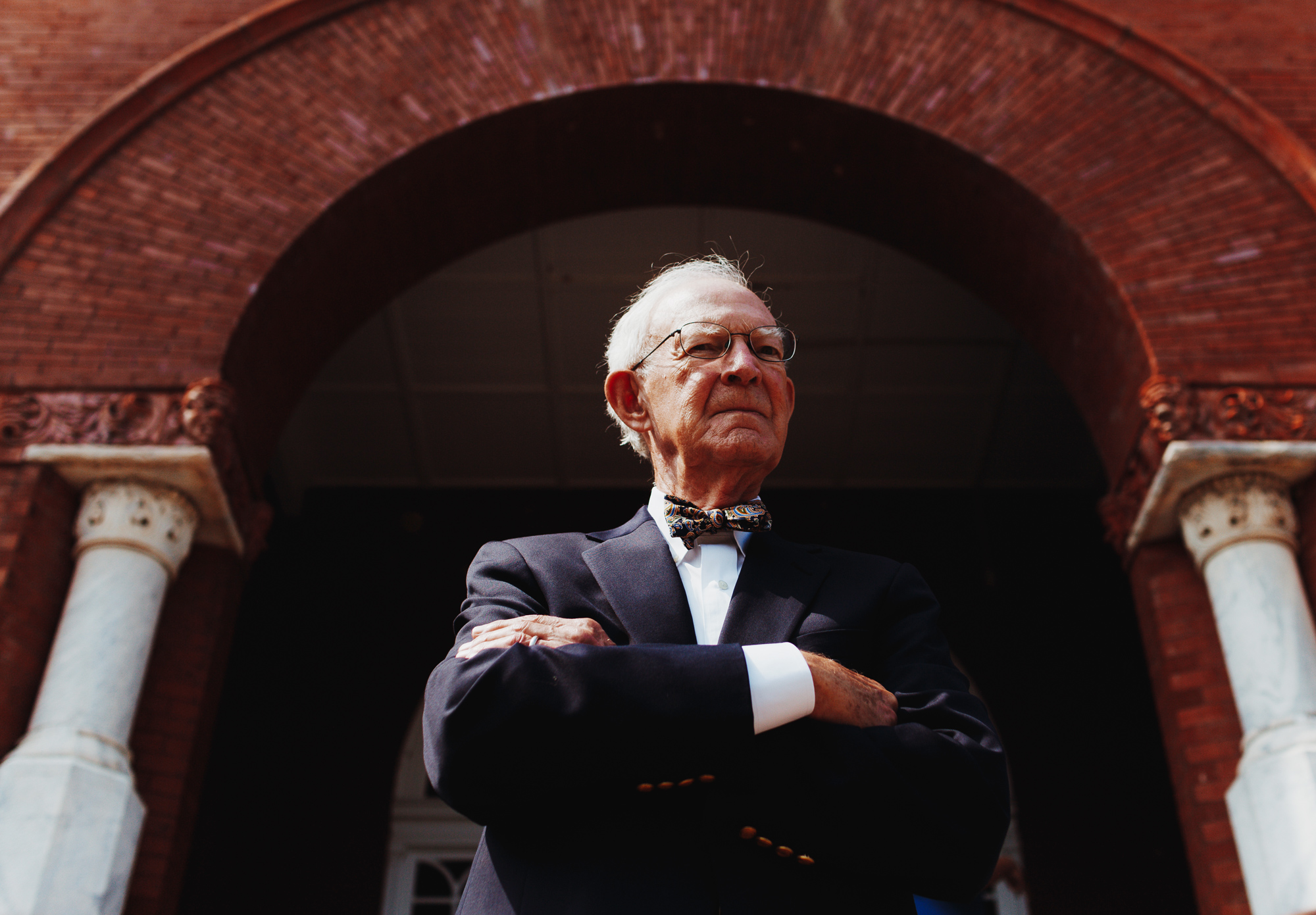Taking a Moral Stand

When you build a career based on impartiality, what happens when you take a stand and pick a side? That's the choice retired Justice Norman S. Fletcher, former Georgia Supreme Court Justice, made when he announced in 2015 that he opposed the death penalty.
His position shocked a lot of people, he says. During his 15 years as a justice, he “participated in dozens of death-penalty cases and affirmed many of them,” he explained in a 2016 New York Times op-ed speaking out against the death penalty in Georgia.
At this point in his life, it does not sit well with Fletcher, 83, from both a moral and a legal standpoint.
“THEY ARE KILLING PEOPLE IN THE NAME OF THE STATE, AND WE’RE PART OF IT.”
“They are killing people in the name of the state, and we’re a part of it,” he says.
“When the state does that, who is the state? It is us. It’s everybody. A lot of people don’t want to recognize that, but who is the state if it’s not the people?”
Now an advocate for abolishing the death penalty, he calls it “morally indefensible” and the product of a flawed and “broken system.”
“People who murder, who take the lives of another, need to be punished. That’s not a problem, but we just don’t need to take the life of someone [to do that],” Fletcher says.
INFORMED BY LEGAL PREDECESSORS || Upon his retirement from the bench, Fletcher joined the Brinson Askew Berry law firm on a consulting basis. In a conference room at their offices in downtown Rome, his years as an attorney shine through. He’s come prepared with a legal file in hand and portions of landmark US Supreme Court cases printed and clipped together with key excerpts highlighted.
Fletcher says the late US Supreme Court Justice Harry Blackmun’s experience as a trial judge, appellate court judge, and finally, a justice made an impression on him.
He reads from a Blackmun early-career dissent in Furman v. Georgia, which put a stay on US executions in 1972. In 1976, the decision was overturned, and executions picked up again.
“This is what Blackmun said in Furman,” Fletcher says. “‘Cases such as these provide for me an excruciating agony of the spirit. I yield to no one in the depth of my distaste, antipathy, and indeed abhorrence for the death penalty with all of its aspects of physical distress and fear of moral judgment exercised by finite minds. That distaste is buttressed by a belief that capital punishment serves no useful purpose that can be demonstrated.’”
Fletcher echoes Blackmun’s words in describing his own change of mind and heart.
“I think what really ultimately changed me after I left the court — for a number of years, there were no executions because they had these discussions about the right drug to be using in carrying out the death penalty,” Fletcher says.
45 people are currently on death row in Georgia.
Georgia executed more prisoners in 2016 than any other state in the nation, although it’s been nearly three years since a Georgia defendant was sentenced to death.
Georgia is sixth on the list for most executions in modern times in the United States. The South carries out the most of any region.
— Georgia Department of Corrections; the Atlanta Journal-Constitution; the Death Penalty Information Center
“Then, all of a sudden, they got through those battles, and they started moving these cases. I started thinking about it very deeply, that I had been a part of the machinery of death. It was very agonizing for me to think about being a part of this system that is flawed, and I couldn’t live with it any longer. I couldn’t live with it.”
So he sat down and began putting his thoughts on paper. “I thought I could do something — I thought it was right to try to correct flaws in our justice system.”
In addition to writing op-eds, Fletcher has used his clout to sign on to a number of amicus curiae briefs aiming to repeal death sentences at the US Supreme Court level, several of which have been successful.
“I HAD BEEN PART OF THE MACHINERY OF DEATH... I COULDN’T LIVE WITH IT.”
INFLUENCED BY FAITH || For Fletcher, he says his anti–death penalty stance is something that evolved over the 10 years following his 2005 retirement from the Georgia Supreme Court.
He says he struggled some with it in the mid-1990s, but after his retirement, he became sure. In early 2015, he worked to write an opinion piece making an appeal to stay Kelly Gissendaner’s execution and announced his position against the death penalty that spring.
His faith, especially as of late, has played a role in his belief that the death penalty is “morally indefensible,” he says. The words of both The Right Rev. Robert Wright and The Rev. Janice Wright (no relation) at St. Peter’s Church in Rome influenced his thought process.
“This was finally brought home to me when in a sermon she proclaimed, ‘If we claim to be following Jesus, we can’t support capital punishment. Jesus died an innocent man at a state execution. He submitted to it. He did not sanction it,’” Fletcher explains.
“And Bishop Rob Wright put it this way: ‘You and I know that Jesus never taught that we should murder a human being no matter how heinous the crime. Christians that tell you differently have made Jesus in their image and put their own words in his mouth. Maybe most tragically, they have forgotten that Jesus himself was put to death by the state in cooperation with fearful religious people at the hand of an indifferent government.’” There are other reasons to reconsider, Fletcher says.
INNOCENTS SENTENCED || There are those who have been wrongly convicted. “Surely the vast majority of people in this country would not want an innocent person executed,” Fletcher says.
He points to the success of the Innocence Project, which has worked to exonerate 351 people across the country, thanks to DNA testing, according to their website. That includes 20 people who were on death row.
FINANCIAL COSTS || As of early 2017, a few state legislators known as Georgia Conservatives Concerned About the Death Penalty had called for reexamining the death penalty, citing the expense to taxpayers. Studies from the early 1990s in Texas and North Carolina found death penalty cases to cost more than $2 million per case. In Texas, that amounted to three times the cost of a maximum-security life sentence, according to the Death Penalty Information Center.
“These cases take up an estimated 10 percent of all court resources, and they involve less than one-tenth of 1 percent of all court filings,” Fletcher says. “That really economically makes no sense. I hate to use economic grounds, but that is really appealing to a lot of real conservatives, and more and more people are looking at pocketbook issues.”
Justice Fletcher is one of several people who have contributed to a book being published by the Diocese of Atlanta Press opposing the death penalty.
Contributors will include The Rt. Rev. Bishop Robert Wright, death penalty attorney Susan Casey, The Rt. Rev. Bishop Andy Doyle of Texas, and Stephen B. Bright, a prominent death penalty appeals attorney and president and senior counsel for the Southern Center for Human Rights.
LACK OF REPRESENTATION || He also points to what can be a lack of access to solid defense options for people who are accused and convicted of crimes and sentenced to the death penalty in Georgia.
Despite the implementation of the state-funded public defender system, which he helped make possible, inmates on death row are not guaranteed representation through the appeals process. As a result, the convicted can miss important appeals deadlines and wind up having to represent themselves. That’s not the case in other states. Fletcher sees that as wrong.
FAILED SAFEGUARDS || When the US Supreme Court reinstated the death penalty in 1976, after a four-year pause, it tried to raise the bar for which crimes would qualify as being eligible for the death penalty. The intent was to reserve it only for “the most heinous” crimes, with fewer people being considered for execution. Fletcher says the issue of these protections is that they offer a false sense of fairness and aren’t applied consistently.
Death sentences may also be influenced by politics. In Georgia, both district attorneys and judges are elected positions. The prosecutor is responsible for deciding whether or not to try to pursue the death penalty as the punishment in a case, and the judge rules if a case will be tried as a capital case, letting the jury decide whether or not to select the death penalty. There appears to be an uptick in the number of death penalty cases tried around election years, Fletcher says.
A ‘JUST END’ IN SIGHT || When asked what it is going to take to end the death penalty, Fletcher says, “I plan to keep on keeping on, speaking out in opposition as long as I live.”
“I think an informed public is the real key to bringing about the change that I think can only be made through the US Supreme Court, because states can come back and change the law again. It will not be put to rest until the US Supreme Court puts it to rest."
He says he is hopeful because the Constitution has been expanded in its interpretation since the very beginning, and he believes the decision will be made based on the principle of evolving standards of decency. In general, the number of executions has gone down since its modern peak in 1999, according to the Death Penalty Information Center. And it’s been nearly three years since a Georgia defendant was sentenced to death, according to the Atlanta Journal-Constitution as of January 2017.
THE RIGHT CASE AT THE RIGHT TIME || For there to be a sweeping national change through a US Supreme Court decision, it will be the right case at the right time — much like Brown v. the Board of Education was for desegregation, a process that took 30 years, Fletcher says. As he and other advocates keep pushing for change, he remains hopeful.
“I really think we are very close to that point, and I pray that it will be reached in my lifetime.”


